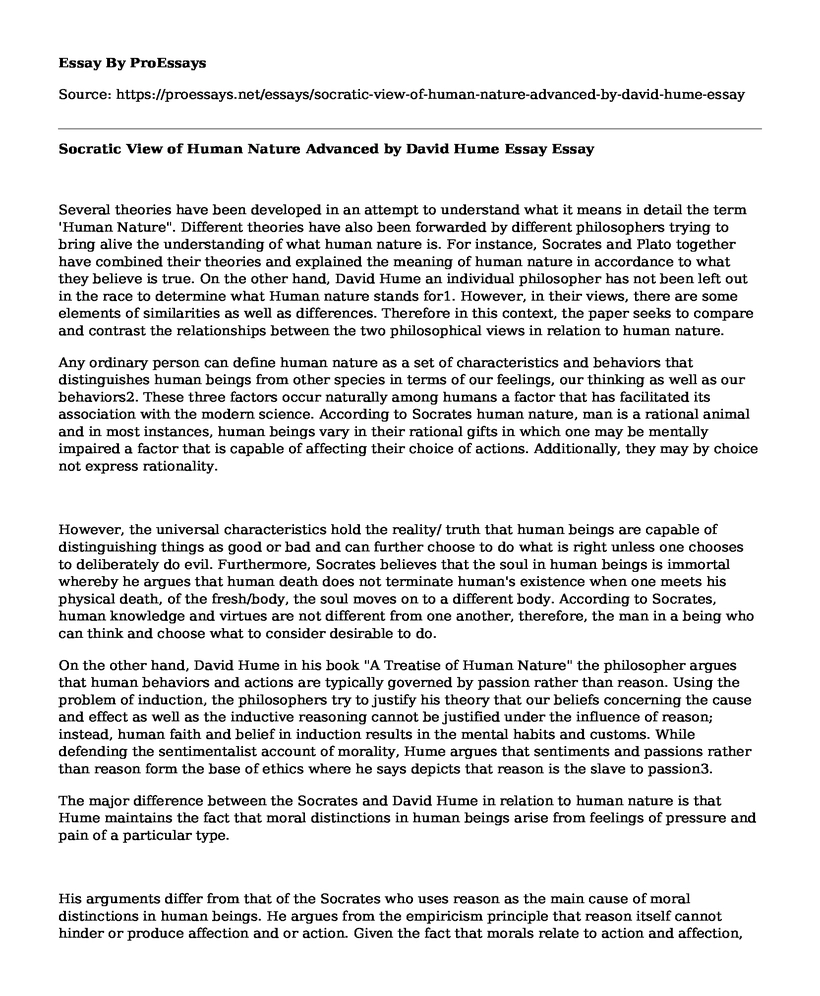Several theories have been developed in an attempt to understand what it means in detail the term 'Human Nature". Different theories have also been forwarded by different philosophers trying to bring alive the understanding of what human nature is. For instance, Socrates and Plato together have combined their theories and explained the meaning of human nature in accordance to what they believe is true. On the other hand, David Hume an individual philosopher has not been left out in the race to determine what Human nature stands for1. However, in their views, there are some elements of similarities as well as differences. Therefore in this context, the paper seeks to compare and contrast the relationships between the two philosophical views in relation to human nature.
Any ordinary person can define human nature as a set of characteristics and behaviors that distinguishes human beings from other species in terms of our feelings, our thinking as well as our behaviors2. These three factors occur naturally among humans a factor that has facilitated its association with the modern science. According to Socrates human nature, man is a rational animal and in most instances, human beings vary in their rational gifts in which one may be mentally impaired a factor that is capable of affecting their choice of actions. Additionally, they may by choice not express rationality.
However, the universal characteristics hold the reality/ truth that human beings are capable of distinguishing things as good or bad and can further choose to do what is right unless one chooses to deliberately do evil. Furthermore, Socrates believes that the soul in human beings is immortal whereby he argues that human death does not terminate human's existence when one meets his physical death, of the fresh/body, the soul moves on to a different body. According to Socrates, human knowledge and virtues are not different from one another, therefore, the man in a being who can think and choose what to consider desirable to do.
On the other hand, David Hume in his book "A Treatise of Human Nature" the philosopher argues that human behaviors and actions are typically governed by passion rather than reason. Using the problem of induction, the philosophers try to justify his theory that our beliefs concerning the cause and effect as well as the inductive reasoning cannot be justified under the influence of reason; instead, human faith and belief in induction results in the mental habits and customs. While defending the sentimentalist account of morality, Hume argues that sentiments and passions rather than reason form the base of ethics where he says depicts that reason is the slave to passion3.
The major difference between the Socrates and David Hume in relation to human nature is that Hume maintains the fact that moral distinctions in human beings arise from feelings of pressure and pain of a particular type.
His arguments differ from that of the Socrates who uses reason as the main cause of moral distinctions in human beings. He argues from the empiricism principle that reason itself cannot hinder or produce affection and or action. Given the fact that morals relate to action and affection, human actions cannot be based on reason. However, the key similarity between the two over human nature is that both apply.
Bibliography
Armstrong, David Malet. Universals: An opinionated introduction. Routledge, 2018.
Arnhart, Larry. Darwinian natural right: The biological ethics of human nature. suny Press, 1998
Johnson, Oliver A. The mind of David Hume: a companion to book I of A treatise of human nature. University of Illinois Press, 1995..
Pellegrino, Edmund D. "Toward a virtue-based normative ethics for the health professions." Kennedy Institute of Ethics Journal 5, no. 3 (1995): 253-277.
Cite this page
Socratic View of Human Nature Advanced by David Hume Essay. (2022, May 09). Retrieved from https://proessays.net/essays/socratic-view-of-human-nature-advanced-by-david-hume-essay
If you are the original author of this essay and no longer wish to have it published on the ProEssays website, please click below to request its removal:
- Ethical Case: Provisions on Accepting Gifts
- Paper Example on Mill's Theory of Utilitarianism
- Animal and Ethics Essay Example
- Ethics in HR Essay Example
- Essay Sample on Immigrant's Journey to the American Dream
- Paper Example on Abortion: A Conundrum of Contention
- Discovering Individuality: An Essential Part of Medicine - Essay Example







